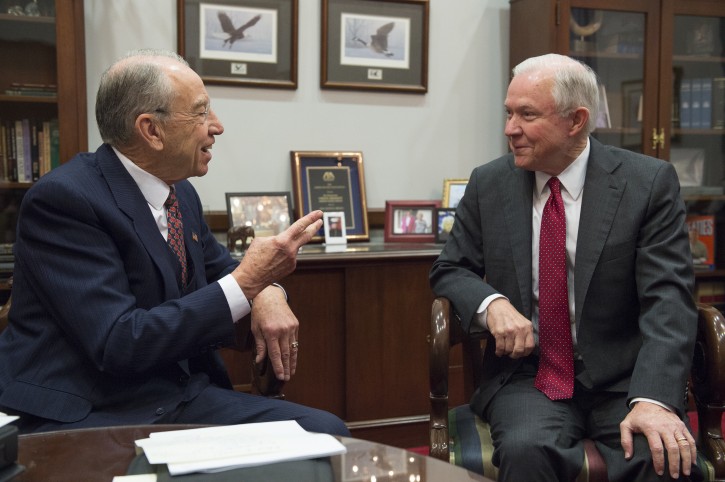
Washington – Senate Republicans are hoping to move quickly to confirm President-elect Donald Trump’s nominee for attorney general, but Democrats say they have concerns about Sen. Jeff Sessions’ views on civil liberties, voting rights and immigration and are asking for time to review his decades of work as a senator and federal prosecutor.
Sessions met Tuesday with Senate Judiciary Committee Chairman Charles Grassley, R-Iowa, the first time a Trump Cabinet nominee has made the customary courtesy call on Capitol Hill.
At the meeting, Grassley said he hopes to hold a confirmation hearing before Trump’s inauguration Jan. 20, setting Sessions up for a quick vote once Trump is president. The Alabama Republican sits on Grassley’s committee and is expected to win confirmation in the GOP-controlled Senate.
“I think everybody knows that he’s going to give even-handed law enforcement as the nation’s top law enforcement officer,” Grassley said.
Some committee Democrats aren’t so sure.
California Sen. Dianne Feinstein, who will be the top Democrat on the Judiciary panel next year, noted that Trump has in the past referred to “my attorney general” when speaking about the office.
“There’s no such thing as a president’s attorney general,” Feinstein said. “You’re attorney general on behalf of the people, not the president.”
Feinstein and other Democrats on the panel have pressed for several days of hearings to review Sessions’ long record. Over the past three decades he has served as a federal prosecutor, attorney general for Alabama and senator.
Led by Feinstein, Democrats on the committee sent Grassley a letter Monday noting that former Sen. John Ashcroft had several days of hearings when he was nominated and eventually confirmed as attorney general under President George W. Bush. They called for a “fair and thorough” hearing on Sessions.
Still, Democrats have little power to block the nominee after their own party changed the rules in 2013 and curbed filibusters on presidential nominations. Previous presidents have needed 60 votes to confirm many of their nominees, but all of Trump’s nominees — save for the Supreme Court — will only need a majority. Republicans are expected to hold 52 seats in the Senate next year.
Democrats haven’t yet said whether they will focus on racially charged allegations that derailed Sessions’ bid to become a federal judge in 1986. That year, the GOP-controlled Judiciary Committee voted against confirming him after he was accused of making the remarks while U.S. attorney in Alabama. Sessions later withdrew from consideration.
Feinstein said she didn’t know yet if Democrats would call some of the same witnesses who testified against Sessions 30 years ago.
Sessions has made “a whole lot of remarks on a whole lot of things since then,” said Vermont Sen. Patrick Leahy, the current top Democrat on the panel.
Sessions has consistently been one of the most conservative voices on the Judiciary Committee, and is known for his support of tough immigration enforcement policies. He has said the Civil Rights Division at the Justice Department provides benefit but should not be used as “a sword to assert inappropriate claims that have the effect of promoting political agendas.” And he has given some prominence to the specter of voting fraud, a problem that current Justice Department leadership believes is negligible.
“I think Sen. Sessions had a long and complex record that deserves to be fully reviewed,” said Sen. Chris Coons, D-Del. “There are areas that I think, based on recent developments and some of Donald Trump’s statements in his presidential campaign, that we should all be paying attention to, not least of which is the protection of civil rights and civil liberties.”
Another committee Democrat, Connecticut Sen. Richard Blumenthal, said he is concerned about Sessions’ record on voting rights and immigration reform. He said Sessions’ nomination is important “in real as well as in symbolic terms about where the administration goes and what its enforcement will be to ensure that people have civil rights and civil liberties.”
Blumenthal said Democrats will need to engage the public to develop opposition.
“We’ll be as persuasive as possible in what we say about it, hoping to reach and arouse as many people as possible,” he said.
Republicans are confident that Sessions will be confirmed. Texas Sen. John Cornyn, the No. 2 Republican in the Senate and a member of the Judiciary Committee, said “those of us who have worked with Jeff Sessions know Jeff Sessions.”
He doubts the hearing will be several days long.
“I think they’d run out of questions after about the first couple of hours,” Cornyn said of the Democrats.
As reported by Vos Iz Neias
